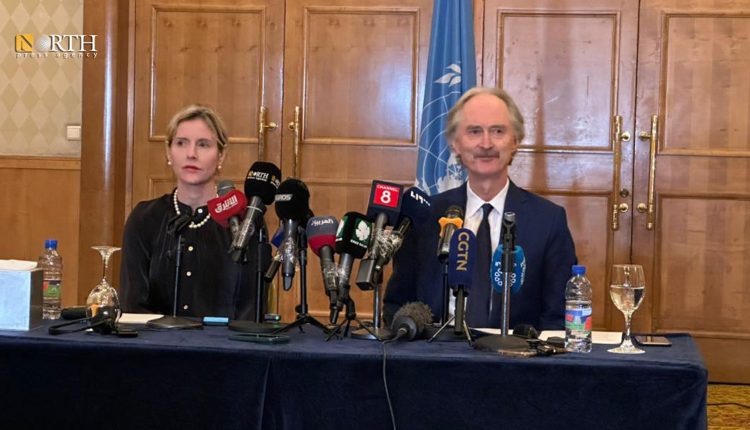UN Envoy Pedersen: New Syrian Government in March Could Ease Sanctions
By Kardo Roj
DAMASCUS, Syria (North Press) – UN Special Envoy for Syria Geir Pedersen stated on Thursday that the formation of an inclusive Syrian government by March 1 could contribute to easing sanctions on the country.
Pedersen’s remarks came during his visit to Damascus following his participation in the Munich Security Conference. Analysts view his trip as particularly significant, as it conveys international messages to Syria’s new leadership amid the country’s ongoing political and economic crisis.
Speaking on the Syrian political process, Pedersen emphasized the need for an inclusive government that represents all segments of society. The UN-backed initiative aims to facilitate a political resolution to the Syrian conflict, which has been ongoing for over a decade.
Sanctions imposed by the US and the European Union have severely impacted Syria’s economy, with humanitarian organizations warning of worsening living conditions. Pedersen suggested that concrete steps toward political reform, including a more representative government, could pave the way for discussions on lifting these sanctions.
On Wednesday, Jennifer Fenton, spokesperson for the UN envoy’s office, told North Press that Pedersen and his team are closely monitoring ongoing negotiations between Damascus and authorities in northeastern Syria. These talks are seen as crucial for achieving broader national reconciliation and stability.
The UN has long advocated for a political solution based on UN Security Council Resolution 2254, which calls for a ceasefire, constitutional reform, and free elections. However, efforts to revive the peace process have faced obstacles due to geopolitical rivalries and internal divisions.
In addition to discussing the political process, Pedersen highlighted the need for Israel to withdraw from areas it occupies in southern Syria. Israel has conducted numerous airstrikes in Syria in recent years, targeting Iranian-linked forces and Syrian military positions. The UN has consistently called for de-escalation and a diplomatic resolution to tensions in the region.
Pedersen’s visit to Damascus signals renewed international engagement in Syria’s political future. As the March 1 deadline approaches, it remains to be seen whether tangible progress will be made toward forming a new government and easing economic pressures on the Syrian people.

